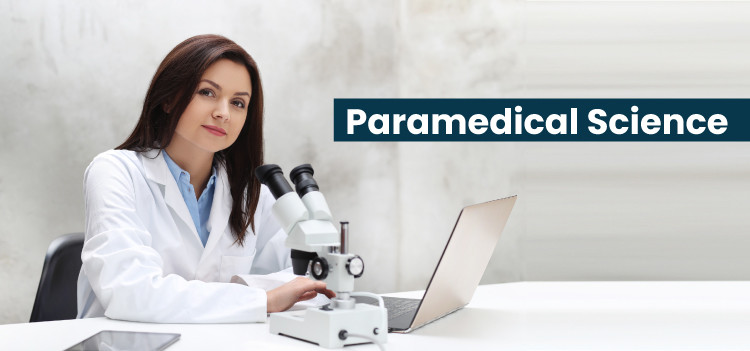The students from paramedical sciences are termed as clinical health care professionals, those who are distinct from the medical, dental and nursing. As the name implies, they are allies in the healthcare team, working together to deliver high quality patient care services.
The Paramedical Sciences basically deals with the applications and practice of different medically related subjects like:
- Medical Imaging Technology (MIT)
- Medical Lab Technology (MLT)
- Optometry
- Perfusion Technology
- Renal Dialysis
- Anaesthesiology
- Health Inspector
- Medical Records Technology
Courses available in Paramedical Sciences
Paramedical science is a broad spectrum with a number of different types of courses available. The field is as vast as the medical field and continues to grow along with the medical field.
Some of the important courses under paramedical sciences are:
- Diploma in Perfusion Technology
- Diploma in Anaesthesia and operation theatre technology
- Diploma in Medical Imaging Technology (MIT)
- Diploma in Renal Dialysis
- Diploma in Optometry
- Diploma in Medical Laboratory Technology (MLT)
- Diploma in Health Inspector
- Diploma in Medical records technology
Diploma in Perfusion Technology: The perfusion technologists prepare and operate heart-lung machines and other sophisticated equipment as directed by the physicians during operations and critical situations. The students are required to perform multiple tasks on the patients and generate the reports of heart and lungs of the patients during surgeries. They are required to measure the blood pressure and many other vital parameters that are very crucial for the life of the patients whenever necessary.
Diploma in Anaesthesia and Operation Theatre Technology: The diploma in Anaesthesia and operation theatre technology course is opted by the students who are interested to learn about anaesthesia along with operation theatre techniques. The course equips the students with the techniques involved in anaesthesia administration, types of anaesthesia agents and also ensures them to closely monitor the patients under anaesthesia influence. The course helps the students to gain in-depth knowledge of operation theatre hygiene, handling of operation theatre equipment and other pre-surgical and post-surgical procedures.
The students are required to perform multiple roles at a given point in time. They are required to assess the patient’s condition for anaesthesia administration and give them the correct amounts and dosage of the anaesthesia according to the patient’s conditions. Students of anaesthesia will also gain knowledge of the correct anaesthesia equipment for the specific patient.
Diploma in Medical Imaging Technology: The diploma in Medical Imaging Technology/Radiology is the paramedical course that can be pursued by the candidates who are interested to perform diagnostics using radiations. Diploma in Medical Imaging Technology/Radiology students are required to take the internal images of the human body. They will be using radiation to take images of the hidden parts of the human body that are not visible to the naked eye.
The diploma in Medical Imaging Technology/Radiology students create diagnostic images of the internal organs of the human body by using different types of radiation with the help of sophisticated equipment.
Diploma in Renal Dialysis: The Diploma in Renal Dialysis Technology course imparts the students with the essential knowledge about the treatments that are given to renal failure patients. The diploma in Renal Dialysis Technology students will be studying different techniques like administering haemodialysis treatments for patients with renal failure.
The students of the diploma in Renal Dialysis Technology will be studying in-depth about the following topics such as basic anatomy, basic physiology, pathology, dialysis preparation, dialyser setup, dialysis prescription interpretation, extracorporeal circuit, maintenance of the Renal equipment, patient preparation, equipment monitoring, venepuncture and local anaesthesia administration, safety and sanitisation, emergency interventions, intravenous fluids injection, professional standards and ethics.
Diploma in Optometry: The diploma in Optometry course has been designed to offer eligible candidates a wide range of clinical skills and knowledge to examine, diagnose, treat and manage diseases and disorders related to eyes and visual system of the human body.
The diploma in optometry students are trained to design the spectacles, lenses and many other optical aids. The diploma in optometry students will be learning about various skills like vision power checking, diagnosing the problems of vision using equipment, performing minor eye corrections, etc. The diploma in Optometry students are trained to apply the correct eye drops for the patients to perform the diagnosis.
Diploma in Medical Lab Technology (MLT): The medical lab technology course is also called clinical laboratory science in the allied health sciences. The students of the diploma in medical laboratory technology (MLT) are given the training to perform various tasks related to human health like treatment, diagnosis and prevention of the diseases using the clinical methods and laboratory tests. They are also given training to handle and maintain various medical testing equipment like CT Scan Machine, X-Ray Machine, MRI Machine, etc.
The students who are interested to join a diploma in Medical Laboratory technology course should have certain qualities like research-oriented mindset, hardworking, accuracy in tasks, should be able to handle the stress and should possess an eye for detail. They are also required to have good communication skills along with interpersonal skills. They are also required to have interpreting technical skills for handling various medical equipment.
Diploma in Health Inspector: Diploma in Health Inspector trains the students about the methods and practices involved in maintaining top notch hygiene conditions. The course gives a detailed knowledge to the students about developing competence in health and family welfare, fulfilling the need for healthcare professionals with regards to government regulations. The course is designed in such a way that it lays emphasis on both theoretical and practical aspects of healthcare and sanitation.
Diploma in Medical Records Technology: The course imparts training on different aspects of medical record collection like data collection, recording techniques, legal aspects, billing, computer application, relevant software, record storage.
A medical records technician is an administrative job that primarily involves administrative tasks such as record keeping in a medical office setting. They do not have anything directly to do with the patient's condition, diagnosis or treatment. The medical records technician keeps the patient’s records updated and complies with healthcare regulations.
Eligibility for Diploma in paramedical course
- The students should have passed their PUC or 10+2 with physics, chemistry, biology and English from recognised board are eligible to apply for Diploma in paramedical course (For 2 years duration)
- The students who have passed their SSLC or 10th from recognised boards are also eligible for Diploma in paramedical courses. (For 3-Years duration)
Career Scope
There are ample career opportunities for the skilled paramedical science professionals. They are largely hired in the healthcare sector at different job roles. They are necessary to assist doctors in hospitals, clinics and nursing homes. Without them, doctors cannot provide treatments. The allied health science professionals are required to diagnose and assist the doctors in providing proper treatments for the patients. Graduates from allied health sciences can join masters and continue their studies for better packages and better job roles. They can join B.Sc programmes in their relevant fields.
Some of the important job roles available are:
- Lab Technicians
- Anaesthesia Assistant
- Nephrologist
- CT Scan Technicians
- Health Inspector
- Medical Records Specialist
- Operation Theatre Assistant
- Renal dialysis operator
- Optician
- Optical Technician
- Renal dialysis technician
Salary Packages & Emoluments
The students after completing the courses in paramedical sciences will be earning an average salary of Rs 3 Lakhs to 5 Lakhs per annum. The salary also will increase according to the experience gained and skills learned during their careers.
Placement Opportunities
Paramedical science students are hired in different sectors of the healthcare industry. Some of the important recruiters hiring allied health science students are:
- Ranbaxy
- Apollo Hospitals
- Medanta Hospitals
- Sun Pharma
- HLL Life Care
- Fortis Hospitals
- Max Healthcare
- Metro hospitals
- Dr. Reddy Path labs
- Padmashree Diagnostic Centre
- HCG Global
- Dr. PathLabs
Conclusion
The advancements in the health care sector have given rise to many new job roles in the sector. The medical field today is not only limited to doctors and nurses, but still more. New job roles and new career opportunities are emerging in the field of medicine. To join the medical field, it is not essential to do MBBS only. The dream of joining the medical field can also be fulfilled even by joining many paramedical science courses.
Every degree has its specific importance and every degree has its value. Top-performing students can find relevant and desired job profiles and land in lucrative careers according to their interests. Students with dedication and interest can always grow in the careers that they have chosen.

